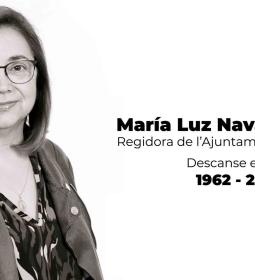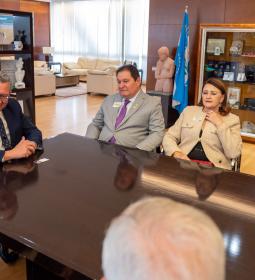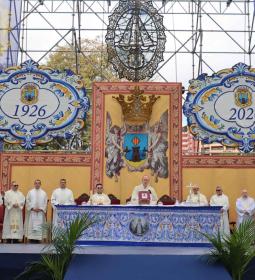The mayor of Benidorm has shared a panel with the executive director of the World Tourism Organization and other experts
Toni Pérez participates in Ágora Meeting remembering the FEMP agreement for a National Pact for Tourism that favors the economic sustainability of the business fabric within the framework of the SDGs

The Agora Meeting that on Tourism and Sustainable Development was held this morning electronically has had five panelists to analyze Tourism, its sustainability and its competitiveness, coinciding with the impact of Covid19.
Helena Ancos, director of Ansari, has moderated a consultative approach and visionary debate in which the executive director of the World Tourism Organization, Manuel Butler; the one who was responsible and coordinator of the European Social Responsibility Program, Pedro Ortún; the mayor of Benidorm, Toni Pérez; the director of Hosteltur, Manuel Mollina; and the director of Viajes Taranná and the Locos porTravel portal, Feli Palacios. The Spanish Federation of Municipalities and Provinces has been an outstanding collaborator of the meeting that has been followed by a significant number of tourism experts and municipalists.
Will this crisis serve for a strategic rethinking of the Tourism sector? After this question, the panelists have presented their postulates, approaches and lines of work.
Toni Pérez, Mayor of Benidorm and Vice President of the Tourism Commission of the FEMP, has highlighted the proposal for the XII plenary session of the body and the constitution, already in a period of confinement and via teleconference, of the Tourism Commission and the work done and proposals already launched. “The first was that of a great national pact for tourism with the direct involvement of all. A plan of special protection for tourism that allows to avoid the destruction of the companies and the jobs they generate, with the extension and flexibility of the ERTE's, and financing and special tax measures for the sector, "he said, which affects" favoring the economic sustainability of the business and labor fabric ”. He recalled that "tourism is a tractor not only for the Spanish economy but also for other industries such as technology".
The recovery of the sector, said Pérez, "will be slow because it depends on national and international factors, and involves several other sectors." And key in this process will be "building trust and promoting safe tourism."
The Mayor of Benidorm insisted on "the need to innovate" and highlighted the resilient nature of this industry, "which must be permanently adapted to the situations it lives in, to the reality in which it develops."
Toni Pérez bet on sustainability "as a guarantee of the future", pointing out "the added value it brings" and putting on the table some examples focused on Benidorm "to break the topics". This is the case of water management: "right now Benidorm consumes 23% less water supplying a population that has doubled its population in the last 25 years."
To questions from those attending the meeting, he pointed out "the importance of urban planning for cities" in relation to the places where cases of tourism phobia have appeared. In this sense, Pérez said, "it is a perversion to make believe that the tourist is responsible, when the solution is in urban planning and the classification of land uses," pointing to the example of Benidorm, with the addition of sustainability, highlighting that this city was "planned in the mid-1950s" and achieved "the first general plan in Spain, which has protected half of its territory since then".
Toni Pérez explained the need for tourism to be attentive to the evolution of the stages; to have clear goals "such as the 2030 horizon and the implementation of the Sustainable Development Goals", and to be attentive to future prescribers because "it is those tourists, today minors, who are already indicating their priorities; Benidorm already attended the WTM in London in 2019 thinking about them.
Manuel Butler, Executive Director of UNWTO, pointed out the three main lines of work of the international organization: restoring confidence under the concept of safe tourism, promoting public-private collaboration and forging the innovation-sustainability duality for the imminent future. Pedro Ortún focused his interventions on the approaches of the European Union, announcing a European Tourism Convention for the end of September, beginning of October, to focus the document's work agenda and presenting on Tourism thinking of 2030, with a view to 2050.
Manuel Molina, director of Hosteltur, pointed out that we are facing a crisis totally different from all previous ones and from which the sector is going to come out completely changed, highlighting the resilience and adaptability of tourism to new circumstances. Molina called for uniformity in standards and protocols and stressed the importance of ICTE's postulates being the ones that will have international implantation. Feli Palacios, for her part, highlighted the projection of sustainability and called for an alliance in the face of the three immediate challenges: giving confidence, maintaining the spirit of the traveler and highlighting the professionalism of all segments of the tourism sector.




